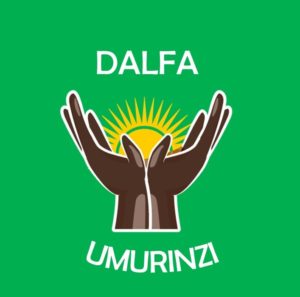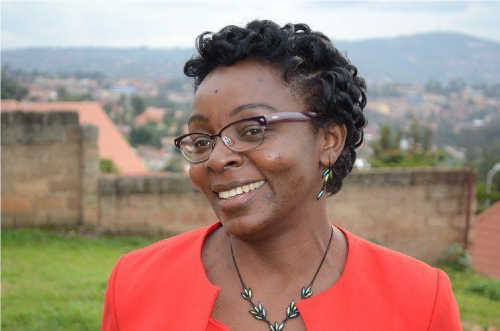
Victoire Ingabire Umuhoza
A Life Dedicated to Serving my Country
June 2020
Due to harassments, demonization, defamation and after multiple death threats made to her, Victoire Ingabire Umuhoza has decided to write her side of the story.
She wrote to also express her indignation about attacks made towards her family and about harassments, unfounded trials and arbitrary imprisonment that several of her colleagues and the youth are subjected to.
My life dedicated to serving my country
Since the Rwandan Patriotic Front took power in Rwanda in 1994, following the Genocide against the Tutsis, it has implemented a relentless strategy aimed at ensuring that they remain the only authorized voice on the national political scene and to reinforce this myth of the ” Saviour of the Nation ” party so popular in the West. During their 26 years rule, numerous political opponents and dissidents of the ruling party were imprisoned, assassinated and others disappeared without leaving any trace.
Since the beginning of my political career, the RPF has quickly realized the threat that my outspokenness and my ideals represented and, as a result, I’ve suffered numerous attacks. Worst still, my family and several of my colleagues were also subjected to defamation, unfounded trials, and arbitrary imprisonment.

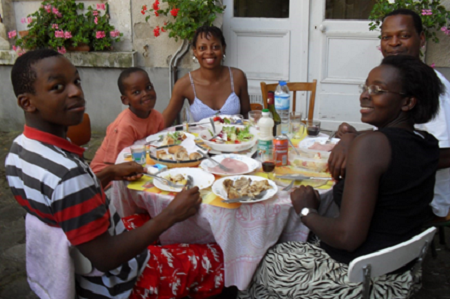
It is for my family, my colleagues, my friends and all the young people in Rwanda and around the world who recognize and hear themselves in my voice, people whose suffering have often been ignored and gone unseen; it’s for all of them that I am speaking today.
Rest assured, the vicious campaign waged against me accusing me cynically and fallaciously of denying the Genocide against the Tutsis and of having a “Genocide ideology” which I would have allegedly have inherited from my parents, far from discouraging me has further strengthened my resolve. However, it is effective in its aim of lowering the political debate in Rwanda. And, unfortunately, it furiously eroding the intrinsic values that used to characterize Rwandans.
To tell you the truth, it breaks my heart when I see the scale of the defamation I face, especially when it is orchestrated by senior officials and media outlets known to be close to power. Worse still, this hatred is channelled through the voices of young men and women recruited into these machines that fill them with the same ideology that I am accused of and that led our country to the Genocide. It reminds me of the words of Jesus Christ when He said, “Do not fear the one who kills the body, but rather fear the one who kills the spirit.” They are killing the minds of young people and in doing so, they are decimating the Rwandan spirit.
Rwandanness – if you allow me the liberty to create a word to translate our vernacular ‘ubunyarwanda’ – has always carried the core values of personal integrity, sincerity, protection, and family honour. It is in this respect that a child is not designated by their own name, but rather by their parentage (son or daughter of so and so). It might seem a discriminatory or reducing appellation, but it is not. It is rather a recognition and a sign of respect for your origins. In the same spirit, we respected the elderly and the authorities, not out of fear but rather because our parents and community leaders earned our respect by their righteousness. Mothers had a special place in society, and rightly so, as the “heart of the household”, and therefore we owed them to be treated with the utmost and strictest respect.
Today, as in our youth, it should naturally fall upon us, the older generation, to transmitting these values to the younger ones. Unfortunately, it is quite the opposite. The vicious propaganda aimed at me is developed and carried out by wellinformed older people as well as by people in places of authority, all of whom should and do know better. Furthermore, instead of inspiring and uplifting the youth, this propaganda machine weaponizes young people and make them the most visible figures of hatred. You will agree with me that all of these are unmistakable signs of the moral degeneration in Rwandan society.
You will easily understand that I am not so much concerned with the false accusations against me but rather with the loss of our spirit, and the loss of the moral standards and values that the Rwandan society normally cherishes and protects so jealously.
I know that those who want to present me as a monster know that they are wrong, but I do not expect them to change their story. This clarification I am making is for the many innocent Rwandans who have an unquenchable thirst for the truth and the restoration of Rwandan values, and for the thousands of people around the world who have always shown us so much compassion. You and I are fighting the same good fight, the fight to ensure that Rwanda does not never plunge again into the pangs of divisionism, war and the merciless massacres of the innocents
Victoire Ingabire Umuhoza
- Born October 3, 1968, in Rubavu, Rwanda
- 1998: Membership of the Republican Rally for Democracy in Rwanda (RDR)
- From 2003 to 2006: President of the Union of Democratic Forces of Rwanda (UFDR)
- 2006 to 2019: President of the Unified Democratic Forces (FDUInkingi)
- January 2010: Return to Rwanda and speech calling for the recognition of all the victims (Kigali Genocide Memorial in Gisozi)
- October 2010: Imprisonment and legal proceedings
- March 8, 2011: Launch of the Victoire Ingabire Umuhoza Prize for Democracy and Peace (Montreal)
- September 25, 2012: Nomination for the Sakharov Prize of the European Parliament in the company of Me Bernard Ntaganda and Déo Mushayidi
- 24 November 2017: Ruling by the African Court on Human and Peoples’ Rights condemning Rwanda for the arbitrary imprisonment of Victoire Ingabire.
- September 15, 2018: Presidential pardon and release with 2,000 other prisoners
- November 9, 2019: Creation of the political party DALFA Umurinzi (opposition based in Rwanda)
- November 14, 2019: Laureate of the international human rights prize awarded by the Spanish Human Rights
My personal story
Let me start by addressing the painful and malicious propaganda targeting my father and my mother. My beloved parents are both shamelessly described as “genocidaires” who would have passed on to me a genocidal ideology. In a country that struggles to seek justice for millions of innocent deaths, critics have no qualms about using claims as gratuitous and caricatural as saying that I would have received the genocidal ideology by suckling my mother’s milk.
Here are some facts. My father Gakumba Pascal was arrested in 1982 and spent four years in prison, accused of being an accomplice in a coup plot against the late President Habyarimana, the alleged great enemy of the RPF. Among the alleged putschists was Colonel Alexis Kanyarengwe, who later joined the RPF and became its chairperson from 1990 until it took power in 1994.
In 1990 when the current ruling party, which was still an armed group, attacked Rwanda, my dad was arrested and detained because he was accused of being an accomplice of the invaders. The same RPF which is now accusing him of being a genocidaire.
My father was later appointed Mayor of Kibilira Commune soon after the RPF took power in 1994 because it appreciated his moral integrity and fight against injustices.
My brother was killed in 1994 by the Interahamwe because he looked like a Tutsi. On the other hand, my aunt with her newly born baby, her husband, his parents and all the siblings were killed by the soldiers of RPF in 1996. Both Interahamwe and members of the RPF killed my relatives and still I am being accused of having genocide ideology.
In 1996, after almost two years as Mayor of Kibilira, my dad was selected to become a member of the National Assembly. He was arrested three days before he was to be sworn in and was released 4 years later, in 2000, without ever being charged with any crime. A signed report by the State Attorney testified that his arrest was related to his selection to become a member of the National Assembly. Someone or people did not want him to become a member of Parliament and therefore had to put a stamp of genocidaire on his name. Residents including Tutsi survivors of genocide testified in his defence. Surely the personal history of my dad does not match the personality of someone with genocide ideology.
In 1996, after almost two years as Mayor of Kibilira, my dad was selected to become member of the National Assembly. He was arrested three days before he was to be sworn in and was released 4 years later, in 2000, without ever being charged of any crime. A signed report by the State Attorney testified that his arrest was related to his selection to become member of the National Assembly. Someone or people did not want him to become member of Parliament and therefore had to put a stamp of genocidaire on his name. Residents including Tutsi survivors of genocide testified in his defence. Surely the personal history of my dad does not match the personality of someone with genocide ideology.
As I mentioned above, my mother Dusabe Therese is also a target of these cynical and slanderous attacks. My own mother, who raised us with love, who has spent her whole life helping others, is falsely accused of having killed a woman at the Butamwa health center where she worked. And this lie continues despite the overwhelming evidence that no one was killed in Butamwa health center during the period indicated. I cannot give more details on this because the case is still ongoing. Quite simply, my parents never had an ideology of genocide and never killed as my detractors want you to believe.
My political career
Despite the fact that it is publicly known I arrived in Holland in March 1994 for my studies and remained there till I returned to Rwanda 16 years later, my detractors want to deceive the world that I am among the founders of an alleged “terrorist group” called RDR founded in 1995 in the Democratic Republic of Congo then called Zaire.
The deliberate lie is built on the fact that there have been two organisations with the same name: the RDR (Rally for the Return of Refugees and Democracy in Rwanda) which was created in 1995 in the refugee camp of Mugunga and which ceased its activities in 1997 after the destruction of the refugee camps and the RDR (Republican Rally for the Democracy in Rwanda) which was created in 1998.
The Rally for the Return of Democracy and Refugees in Rwanda, of which I was not a member, was a lobby and advocacy group for refugees living mainly in Zaire, Tanzania, and Burundi. It advocated for a peaceful and orderly return of refugees to Rwanda in dignity. It was chaired by François Nzabahimana, assisted among others by Vice-President Aloys Ngendahimana and Executive Secretary Innocent Butare. Its management was based in Nairobi, Zaire, and Tanzania.
The decision to form a political party called RDR (Republican Rally for the Democracy in Rwanda) was taken at a congress held in Paris in 1998. Charles Ndereyehe became its president and Claver Kanyarushoki its vice-president. The members of the newly created political party were mainly Rwandan refugees, some of whom had been leading members of the Rally’s pressure group for the return of refugees. The leadership of the Republican Rally for Democracy was based in Europe.
In September 1998, the RDR formed an alliance with another political organization, the FRD (Forces de Résistance pour la Démocratie), led by Faustin Twagiramungu, to form the “Union des Forces Démocratiques Rwandaises “(UFDR). The two organizations developed a joint political programme. Faustin Twagiramungu became president and Charles Ndereyehe vice-president. It is important to note that the FRD was largely created by people who participated in the post-genocide government and who were forced to flee the country when they refused to continue supporting the political line of the RPF. This “new” wave of refugees arrived abroad starting in 1995.
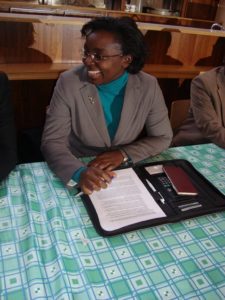 A few years later, I had the immense honour and privilege to be elected president of the Republican Rally for Democracy in Rwanda during the party’s congress held in Bonn in August 2000, which adopted the new political line of this new political organisation. It is quite important to note two key resolutions taken at this congress: it reaffirmed its condemnation of the genocide committed against Tutsis in 1994, and it ruled out the military option as a means to bring political change in Rwanda.
A few years later, I had the immense honour and privilege to be elected president of the Republican Rally for Democracy in Rwanda during the party’s congress held in Bonn in August 2000, which adopted the new political line of this new political organisation. It is quite important to note two key resolutions taken at this congress: it reaffirmed its condemnation of the genocide committed against Tutsis in 1994, and it ruled out the military option as a means to bring political change in Rwanda.
This latter resolution led to a split within the party. Those who opted for the military option left the party and joined others to create the Democratic Forces for the Liberation of Rwanda known by the French acronym FDLR (Forces Démocratiques de Libération du Rwanda) in September 2000. Among them, Ignace Murwanashyaka, former representative of the RDR in Germany, who became President of this new organisation. This makes it quite a disingenuous lie to state that I worked with FDLR or that I deny genocide against Tutsi.
In 2006, three political organisations namely the FRD, RDR, Alliance Démocratique Rwandaise (ADR-Isangano) merged to form “les Forces Démocratiques Unifiées” (FDU-Inkingi). The new political movement was joined by independents. The objective was to unify non-armed opposition political parties outside Rwanda.
In 2008, FDU-Inkingi made a historical decision: to participate in the Rwandan presidential elections scheduled for August 2010. As the President of the movement, I made the journey home in January 2010, to present my candidacy to the highest office in the country. Countless obstacles were erected in my path to prevent me from registering the party. I was arrested, detained, and finally sentenced to 15 years in prison for minimizing the genocide, inciting the population against the government, and conspiracy.
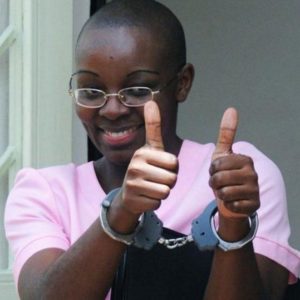 The African Court of Human and Peoples’ Rights in Arusha ruled on 24 November 2017 that my rights had been violated and asked the Rwandan government to pay reparations; a ruling that the Rwandan government has ignored.
The African Court of Human and Peoples’ Rights in Arusha ruled on 24 November 2017 that my rights had been violated and asked the Rwandan government to pay reparations; a ruling that the Rwandan government has ignored.
Ironically, and in stark contrast to the virulence and contempt that we Rwandans are subjected to, Kigali showed extraordinary restraint when in April 2020, the same words that were turned into accusations of negationism and genocide denial against me and have resulted in me being incarcerated for many years – that not failing to honour and remembering all the victims presents an incomplete picture of the darkest part of Rwandan history – have been publicly expressed by the two most powerful allies of Kigali, the American and British governments, at the United Nations podium and in official statements shared with the whole world.
After eight years unjustly spent in prison, I was released on 14 September 2018 under a presidential pardon with conditions attached to it including not being allowed to leave the country and to show up at the prosecutor’s office once of month. I thanked President Kagame for his clemency.
While it is crystal clear that the propaganda waged against me is not only false, it also puts my life at risk of significant harm. It is mind-blowing that these people and media are immune from prosecution because of their close links to the system. By calling to harm and even murder someone simply because they are exercising their political and civil rights guaranteed by the National Constitution to everyone, even if you are in the opposition.
They violate in all impunity laws on character assassination/ defamation and incitement to hatred.
In November 2019, I left FDU-Inkingi and established the new political party DALFA-UMURINZI.
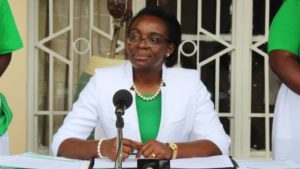
My departure has nothing to do with the allegations that the FDU is a terrorist organization. My well-considered decision stems from the fact that, as my travel abroad is restricted as part of my parole, it had become difficult for me to run a political organisation on the internet or by phone as the majority of members are based outside the country and I am not allowed to leave the country.
I call upon my Rwandan compatriots and friends of Rwanda to help us stop the spread of this culture of physical and verbal violence which is gradually destroying our society. We need to hold on to the values that made Rwandans unique and not destroy our social capital if we truly want to build a strong nation.
I do not hold any grudge against anyone but rather pity my detractors and worry for my country’s future if the current trend is maintained.
Kigali June 8, 2020

Mrs Victoire Ingabire Umuhoza
President DALFA – Umurinzi
